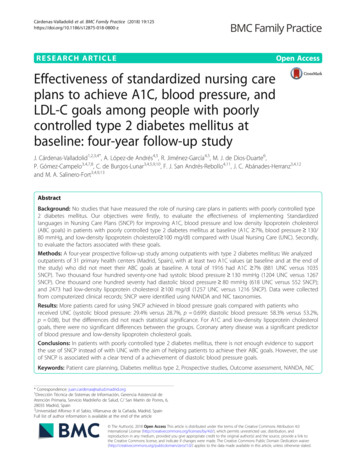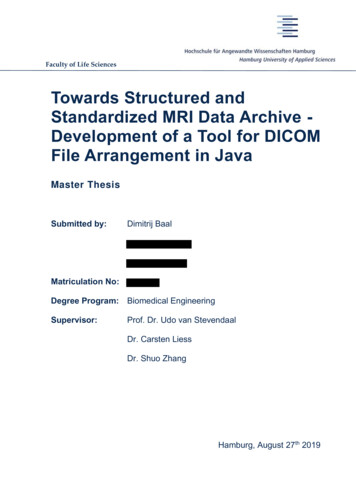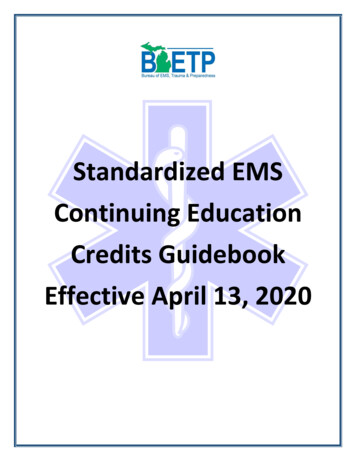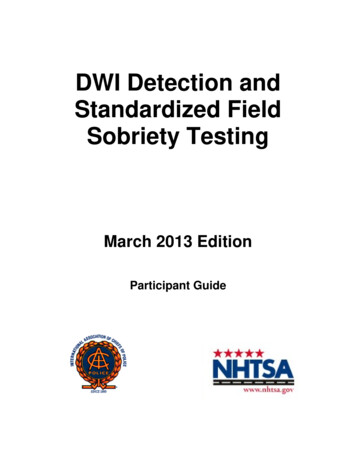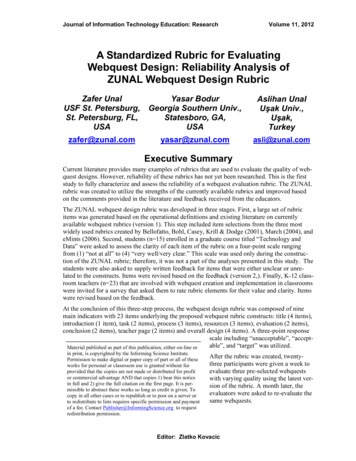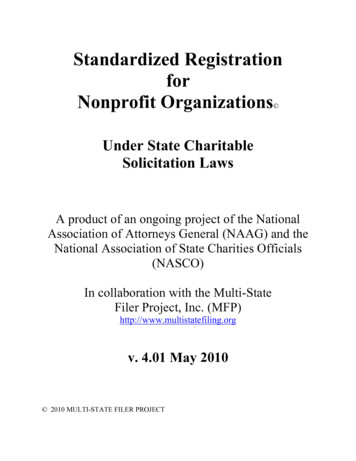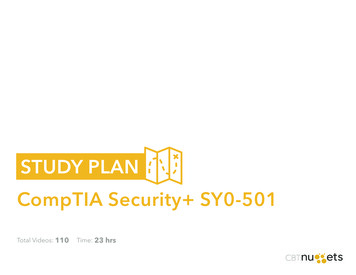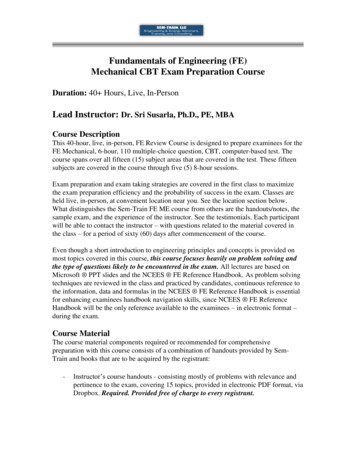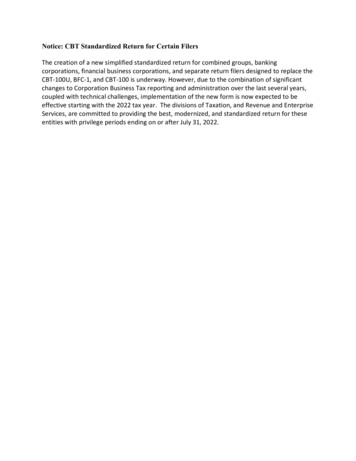
Transcription
Notice: CBT Standardized Return for Certain FilersThe creation of a new simplified standardized return for combined groups, bankingcorporations, financial business corporations, and separate return filers designed to replace theCBT-100U, BFC-1, and CBT-100 is underway. However, due to the combination of significantchanges to Corporation Business Tax reporting and administration over the last several years,coupled with technical challenges, implementation of the new form is now expected to beeffective starting with the 2022 tax year. The divisions of Taxation, and Revenue and EnterpriseServices, are committed to providing the best, modernized, and standardized return for theseentities with privilege periods ending on or after July 31, 2022.
State of New JerseyDepartment of the TreasuryDivision of TaxationDear Taxpayer,2020 has been a challenging year for all of us both in our personal and professional lives. I want to assure you that the Division hasbeen hard at work in our efforts to help taxpayers overcome any compliance challenges they’re facing in these unprecedented times.Our Administration worked together with stakeholders and the legislature on a series of technical corrections, clarifications, andchanges in legislation affecting the Corporation Business Tax Act. This collaboration resulted in legislation that was signed into law onNovember 4, 2020 (P.L. 2020, c. 118). A list of changes from this law is detailed in TB-97, which I encourage you to review.As you file your return, look for the “New for 2020” graphic throughout the instructions, which highlights this year’s tax changes. I’d alsolike to take this opportunity to highlight a few items of particular importance. Due Date. The original due date of the Corporation Business Tax returns for Banking and Financial Institutions is now 30 days afterthe due date of the federal return. For administrative purposes, the Division will use the 15th day of the month following the federaldue date unless that results in a less than 30-day filing window. However, the due dates for estimated payments are unaffected bythe law. Taxpayers that are required to make estimated payments must still submit such payments on or before the 15th day of thefourth, sixth, ninth, and 12th months. Reporting Income. All BFC filers must transition to reporting their income in the same manner as other Corporation Business Taxreturn filers. If a banking corporation files on a fiscal basis for federal purposes, they have the option to transition to a fiscal filing period for filing their return. Copy of Federal Return Mandatory. Taxpayers must include a copy of their federal return and any pertinent extracts of the federalreturn as part of a full and complete New Jersey return. Surtax. The surtax was extended through December 31, 2023, at the rate of 2.5% on all filers with allocated taxable net income over 1 million. As originally enacted, the surtax was scheduled to decrease from 2.5% to 1.5% for privilege periods beginning on or afterJanuary 1, 2020, and expire for privilege periods beginning on or after January 1, 2022. There will not be penalties or interest assessed on underpayments resulting from the retroactive application of the increased surtax. Net Operating Losses. For tax years beginning on and after January 1, 2020, the federal rules and regulations governing consolidated return net operating losses and net operating loss carryovers apply to the New Jersey net operating loss carryover provisionsto the extent they are consistent with the provisions of the New Jersey Corporation Business Tax Act. If the New Jersey and federalprovisions differ, the New Jersey Corporation Business Tax Act provisions govern. New Jersey generally follows the federal rulesgoverning mergers, acquisitions, reorganizations, spin-offs, split-offs, dissolution, bankruptcy, or any form of cessation of a business.New Jersey also follows any other provision of the federal rules that limits or reduces federal net operating losses and federal netoperating loss carryovers. Dividend Exclusion. The tiered dividend exclusion, previously calculated on Schedule RT, has been replaced with a Tiered Subsidiary Dividend Pyramid Tax Credit.Looking ahead, I want to make sure you are aware that this is the last year Form BFC-1 will exist in this format. Under P.L. 2020, c.118,the Division has been mandated to create a new and simplified standardized return for privilege periods ending on and after July 31,2021. For privilege periods ending on and after July 1, 2021, BFC-1 filers will be required to make all payments and submit all returnselectronically.If you have questions about filing your return, please visit our website. I know times are still hard for many of us, but the experiences ofthis past year give me hope for better times and new opportunities aheadSincerely,John FicaraActing DirectorDivision of Taxation
BFC-1(12/20)STATE OF NEW JERSEYDIVISION OF TAXATION – CORPORATION TAXINSTRUCTIONS FOR BANKING AND FINANCIAL BUSINESS TAX RETURN(Form BFC-1 – 2020)Note: These instructions are applicable only to taxpayers filing on Form BFC-1.Federal/State Tax AgreementThe law mandates the creation of a simplifiedstandardized return for privilege periods ending onand after July 31, 2021. Form BFC-1 will bereplaced with the new standardized return nextyear for filers that have completed the normalized reportingprocess. Banking corporations that have not already transitioned away from the historic income reporting method mustfile transitionary returns, including short period returns ifapplicable, on Form BFC-1 to normalize their incomereporting.The New Jersey Division of Taxation and the Internal RevenueService participate in a Federal/State program for the mutualexchange of tax information to verify the accuracy and consistency of information reported on federal and New Jersey taxreturns.Tax PreparersTax preparers who fail to sign the return and provide their assigned tax identification number shall be liable for a 25 penalty for each failure. If the tax preparer is not self-employed, thename of the tax preparer’s employer and the employer’s taxidentification number should also be provided.Before You BeginRead all instructions carefully before completing returns.Corporations Required to FileInclude a complete copy of the federal Form1120 (or any other federal corporate return filed)and all related forms and schedules. Corporationsthat are part of a federal consolidated group must include afederal income tax return and the consolidating schedulesshowing the income statement, balance sheets, and all othersupporting information for the taxpayer.In general, every corporation existing under the laws of theState of New Jersey is required to file a Corporation BusinessTax return.In addition, a return must be filed by every foreign corporationthat:Personal Liability of Officers and DirectorsAny officer or director of any corporation who shall distribute orcause to be distributed any assets in dissolution or liquidationto the stockholders without having first paid all corporationfranchise taxes, fees, penalties and interest imposed on saidcorporation, in accordance with N.J.S.A. 14A:6-12, N.J.S.A.54:50-18 and other applicable provisions of law, shall be personally liable for said unpaid taxes, fees, penalties, and interest. Compliance with N.J.S.A. 54:50-13 is also required in thecase of certain mergers, consolidations and dissolutions.Distortion of Net IncomeThe Director is authorized to adjust and redetermine items ofgross receipts and expenses as may be necessary to makea fair and reasonable determination of tax payable under theCorporation Business Tax Act. For details regarding the conditions under which this authority may be exercised, refer toregulation N.J.A.C. 18:7-5.10.1.Holds a general certificate of authority to do business inthis State issued by the Secretary of State; or2.Holds a certificate, license, or other authorization issuedby any other department or agency of this State, authorizing the company to engage in corporate activity within thisState; or3.Derives income from this State; or4.Employs or owns capital within this State; or5.Employs or owns property in this State; or6.Maintains an office in this State who, in addition, qualifiesas one of the following:(a) a banking corporation defined at N.J.S.A. 54:10A-36, or(b) a financial corporation defined at N.J.A.C. 18:7-1.16.Note: Taxpayer must complete Schedule A-7 and submit itattached to the BFC-1.A foreign corporation that is a partner of a New Jersey partnership is deemed subject to tax in the State and must file areturn.Accounting MethodWho may be Subject to Tax. Any domestic or foreign corporation, joint-stock company or association, and any businessconducted by a trustee or trustees wherein interest or ownership is evidenced by a certificate of interest or ownershipor similar written instrument is subject to tax. This includeslimited partnership associations organized pursuant to N.J.S.A.42:3-1 et seq. and foreign limited partnership associations. Nonew limited partnership associations shall be formed in NewJersey after September 21, 1988. In general, limited liabilityThe return must be completed using the same method of accounting, cash, accrual or other basis, that was employed inthe taxpayer’s federal income tax return.RidersIf space is insufficient, include riders in the same form as theoriginal printed sheets. The riders must be numbered andclearly list the schedule(s) and line(s) of each correspondingrider item.-1-
Professional Corporations. Corporations formed underN.J.S.A. 14A:17-1 et seq. or any similar laws of a possessionor territory of the U.S., a state, or political subdivision thereof,must complete Schedule PC. Examples of licensed professionals include certified public accountants, architects, optometrists, professional engineers, land surveyors, land planners,chiropractors, physical therapists, registered professionalnurses, dentists, osteopaths, physicians and surgeons, doctorsof medicine, doctors of dentistry, podiatrists, veterinarians and,attorneys.companies are required to file for New Jersey purposes in thesame manner that they report for federal purposes.Corporations Claiming Nexus Immunity. Foreign corporations that meet the filing requirements and whose income is immune from tax pursuant to Public Law 86-272, must obtain andcomplete Schedule N, Nexus – Immune Activity Declaration,and all of the schedules from the BFC-1. In addition, taxpayersmust include a copy of the Nexus Questionnaire. P.L. 86-272filers are not subject to the surtax imposed by N.J.S.A. 54:10A5.41, and will enter zero on page 1, line 5. These corporationsmust remit the minimum tax with the BFC-1.Inactive Corporations. Inactive corporations that, during theperiod covered by the return, did not conduct any business, didnot have any income, receipts or expenses, and did not ownany assets, must complete the Certification of Inactivity sectionon page 1. Payment for the related minimum tax liability andthe installment payment (if applicable) must be submitted electronically. See the Page 1 section for more information.Out-of-Business Corporations. Corporations that are “out ofbusiness” but have not dissolved or withdrawn their authority todo business in New Jersey, are still obligated to file a return. Adissolution or withdrawal date must be established on or beforethe last day of the current tax period in order to avoid having tofile a return for the next tax period.Combined ReportingNew Corporations. Every New Jersey Banking or FinancialCorporation acquires a taxable status under the New JerseyCorporation Business Tax Act beginning on the date of its incorporation, regardless of whether it had assets or conductedany business activities.New Jersey enacted mandatory combined reporting for unitarybusinesses for tax years ending on and after July 31, 2019.Groups of companies that have common ownership and areengaged in a unitary business, where at least one member ofthe group is subject to the New Jersey Corporation BusinessTax, are required to calculate their tax liability on a combinedbasis on Form CBT-100U, Corporation Business Tax UnitaryReturn.A tax return must be filed for each fiscal period, or part thereof,beginning on the date of incorporation in New Jersey. No returnmay cover a period exceeding 12 months, even by a day.A member of a combined group filing a New Jersey combinedreturn does not have to file a separate return for the privilegeperiod or portion of the privilege period thereof that the taxpayer was included as a member of the combined return. Acombined group member with business operations that areindependent of the unitary business activity of the combinedgroup must report such income on Schedule X. Schedule X issubmitted with the combined return. The member will not complete a separate return.A newly chartered banking corporation or a newly authorizedforeign financial corporation that did not commence doing business in New Jersey during the period covered by its first returnmust file Form CBT-100 as a regular corporation. All othersmust file returns on Form BFC-1.S Corporations. Every corporation that elects to be a NewJersey S corporation must file a “New Jersey S Corporationor New Jersey QSSS Election” (Form CBT-2553) within onecalendar month subsequent to the federal S corporation filingrequirement.Visit the Division’s website for information about combinedreporting.Combinable Captive Insurance Companies. Combinable captive insurance companies are no longer exempt fromthe Corporation Business Tax. If the combinable captive insurance company is not included as a member of a combinedgroup filing a New Jersey Corporation Business Tax UnitaryReturn, Form CBT-100U, they must file a New Jersey separateCorporation Business Tax Return, Form CBT-100.Note: A taxpayer that has nexus with New Jersey that is partof a combined group or affiliated group, but excludedfrom the New Jersey combined return must file a separate return.Former Member of Combined Group. A taxpayer that wasa member of a combined group filing a New Jersey combinedreturn for part of the group privilege period and subsequentlydeparts the combined group to file on a separate entity basis,must report the income for months subsequent to departingthe combined group on a separate return (Form BFC-1) unlessthe taxpayer joined a second combined group that files a NewJersey combined return. The taxpayer filing a separate returnwould not report the income on Form BFC-1 for the monthsduring which the member was part of the combined group.If determining what amount of income is attributable to theportions of the 12-month period are for the periods before andafter departing a combined group, the taxpayer must proratetheir income/losses and receipts. These taxpayers do notcheck the “BFC-1-F Filer” box on page 1 of the return.Note: A regular captive insurance company that does notmeet the definition of a combinable captive insurancecompany in N.J.S.A. 54:10A-4(y) is still exempt from theCorporation Business Tax.Financial Business Corporations. Corporations that qualifyas financial businesses, those that derive 75% of their grossincome from the financial activities enumerated at N.J.A.C.18:7-1.16(a)1 through (a)7, must file the New Jersey Corporation Business Tax Return for Banking and Financial Business,Form BFC-1.Note: Banking Corporations and Financial Business Corporations that do not qualify to file Form BFC-1 must complete Form CBT-100.-2-
When to Filefiled Form BFC-200-T. Submit the completed BFC-200-T withpayment of the total amount due as reflected on line 8. Thetentative return must be postmarked on or before the originaldue date of the tax return. If a request for extension is dulymade, it will be granted by the Division. Approved extensionswill not be confirmed in writing.2020 Accounting Periods and Due DatesThe 2020 Corporation Business Tax return should only beused for accounting periods ending on and after July 31, 2020,through June 30, 2021. Most banking corporations must reporton a calendar year basis (see N.J.S.A. 54:10A-34). However,financial corporations can report on a fiscal year basis.An extension of time is granted only to file your New JerseyCorporation Business Tax return. There is no extension of timeto pay the tax due. The Division will notify you only if we denyyour extension request, but not until after you actually file yourreturn. Penalties and interest are imposed whenever tax is paidafter the original due date.For privilege periods ending on and after July 31,2020, the due date for all Corporation Business Taxreturns and payments except estimated payments is30 days after the original due date of the federal corporate income tax return. If the due date falls on a weekend or a legalholiday, the return and payment are due on the following business day. Use the following schedule for the 2020 BFC-1 andpayments:If accountingJuly 31,period ends on:2020Due date forDec. 15,filing is:2020If accountingJan. 31,period ends on:2021Due date forJune 15,filing is:2021Aug. 31, Sept. 30, Oct. 31,202020202020Jan. 15, Feb. 15, Mar. 15,202120212021Feb. 28, Mar. 31, Apr. 30,202120212021July 15, Aug. 15, Sept. 15,202120212021Nov. 30,2020Apr. 15,2021May 31,2021Oct. 15,2021Note: An extension payment must include any applicableprofessional corporation (PC) fees and/or installmentpayments.Dec. 31,2020May 15,2021June 30,2021Nov. 15,2021Payment of TaxThe balance of tax due must be paid in full by the original duedate of the return.In addition, corporations are required to make installment payments of estimated tax. The requirement for making these payments is based on the amount of the total tax liability shown onthe most recent return.Note: The start of the 2020 filing season was delayed due tochanges to the Corporation Business Tax statutes. Information on affected due dates is available on the Divisionof Taxation’s website. If the 2020 total tax liability is greater than 500, thetaxpayer must make installment payments towards 2021.These payments are remitted on Form BFC-150 and aredue on or before the 15th day of the 4th, 6th, 9th and 12thmonths of the tax year. Taxpayers with gross receiptsgreater than or equal to 50,000,000 must make installmentpayments on the 15th day of the 4th, 6th, and 12th monthsof the tax year.Calendar or fiscal accounting year is the same accounting period that the taxpayer is required to report to the United StatesTreasury Department for federal income tax purposes. Pleasenote the ending month of the accounting period for federalreturns and New Jersey returns must match, however, the taxreturn year for the federal and State returns may differ. (i.e., atax year ending 8/31/20 may be filed on a 2019 federal Form1120; the same tax year must be filed on a 2020 NJ BFC-1.) Allaccounting periods must end on the last day of the month, except that taxpayers may use the same 52-53 week accountingyear that is used for federal income tax purposes. See N.J.A.C.18:7-2.3. Returns for prior tax years are available on the Division’s website. If the 2020 total tax liability is 500 or less, installmentpayments may be made as indicated above OR in lieu ofmaking installment payments, the taxpayer may make apayment of 50% of the 2020 total tax liability.How to PayMake remittance payable to “State of New Jersey – BFC.”Send payments to the address listed on the form beingremitted.BFC-1-F Filers. A banking corporation filing as part of a combined group that uses a fiscal year basis must align its tax yearwith the combined group. To do so, the corporation must filea short period return that covers January 1 through the end ofthe month of the combined group’s group privilege period. Inaddition, the corporation must notify the Division that it is converting to a fiscal year basis by checking the box on page 1of the return indicating that it is filing as a “BFC-1-F Fi
If the New Jersey and federal provisions differ, the New Jersey Corporation Business Tax Act provisions govern. New Jersey generally follows the federal rules governing mergers, acquisitions, reorganizations, spin-offs, split-offs, dissolution
